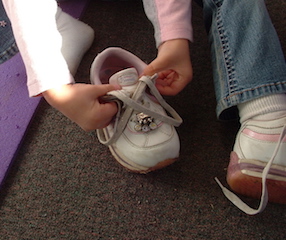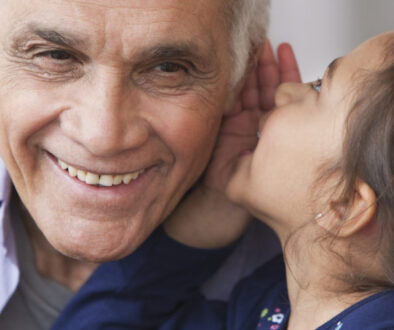Are you an anxious adult learner?
Having an unsupportive learning environment either at home or at school or having a few bad learning experiences, can cause you to feel stress in all learning environments. This can lead you to become an anxious adult learner.
Let’s start with the analogy of teaching a child to tie their shoes
It’s important to focus on how you teach a child to tie their shoes.
Now, you might be from the school of tying the two bunny ears in a bow or the bunny going around the tree and down the hole. After doing a quick Google search I also discovered a couple of other ways too!
The point is, regardless of which method you teach, do you:
- Expect that your child is going to get it right first go?
- Tell them they’re going to get it wrong or not going to be able to do it?
- After many attempts, say: You’re probably never going to get this right?
- Criticise them for every mistake they make?
- Make fun of them if they get frustrated, impatient or upset?
NO! of course not. That would be emotional abuse.
But think about what you say to yourself and expect from yourself when you’re trying to learn something new as an adult.
It’s quite possible that you’ve done all of those things above!
Contributing factors for being an anxious adult learner
1. Mindset and self-talk. From the analogy above, it’s easy to recognise that having unrealistic expectations and unsupportive or hurtful self-talk can significantly contribute to you being an anxious adult learner.It’s important to meet yourself where you’re currently at and cut yourself some slack. As they say, Rome wasn’t built in a day! Even people with ‘natural’ skills still need to put effort into learning and practise.
2. Family dynamics. Imagine if you were regularly told you’d never amount to anything or told you were stupid as a child or teenager. How do you think that would impact your ability and desire to learn as an adult? Not great, right?! You probably have a number of subconscious blocks and fears around learning, which could lead to you feeling anxious when doing new things.
3. Traumatic experience. Did you ever have a teacher at school that intimidated you, made fun of you or humiliated you in front of the class? Perhaps you were learning to ride a bike and crashed and hurt yourself quite badly or were learning to drive and damaged your parent’s car or maybe even injured someone. These types of traumatic learning experiences can lead to you becoming an anxious adult learner.
I’ll give you a personal example. My Dad was a teacher and was normally very patient. However, he tried to teach me to drive when I was about 11 or 12 years old and he was working seven days a week and was tired and stressed. At one point he ended-up yelling at me (that’s what it felt like) and that was it for me. I didn’t learn to drive again until I was 19.
I don’t know whether it was due to that experience or not, but whenever anyone is aggressive or raises their voice at me when I’m learning, I have an anxious response and start to shut down out of protection.
4. Learning under pressure. Some people think they learn better under pressure, but from my experience as a Qualified Navigator Instructor in the Air Force, this really only works when the student has a solid foundation and perception of their abilities and can handle the challenge. Otherwise you can very easily undermine the confidence they were starting to develop.
If you’re someone who experiences anxiety, pressure is generally not helpful when you’re learning. That’s why it’s important to cut yourself some slack!
5. Self-perception. If you have low self-esteem or poor self-perception, you will probably be worried about what other people think of you if you make mistakes, can’t get it right, let others down, don’t learn fast enough and a number of other ‘stories’ we worry about in our minds.
This anxiety stems from internal fears and misperceptions rather than any real or actual expectations from the learning environment or teacher.
You’ll notice that changing these five things is largely in your control. Initially, you may need some professional support to help resolve trauma and childhood imprints and develop a healthy mindset, self-talk and self-perception. And then it will be a matter of ‘practise makes perfect.’
3 Tips if you’re an anxious adult learner or have anxiety in general
For us to change to become the cool, calm and connected adults we’d like to be, we have to learn and practise:
- new skills
- new thoughts
- new actions
- new expectations
- new self-perception
- new beliefs
- new boundaries
- new self-talk
- new emotional intelligence
- new self-expression
If a part of you just felt a little anxious or panicked at all of those new things, remember that within you is also the encouraging, supportive, knowing parent who will be with you every step of the way as you learn to tie your cool, calm and connected shoelaces.
This parent part of you also knows when you need help and will guide you wisely.
1. The parent adult child model
It’s helpful to remember as an anxious adult learner that we are only ever really dealing with three aspects of ourselves:
- The child – the parts of us that haven’t fully developed due to the environments we grew up in or stressful life experiences.
- The parent – the parts of us that have to nurture, positively discipline, encourage, motivate and support the under-developed parts of us.
- The adult – the parts that are fully grown, authentic, empowered, calm and present.
That’s it – the child, the parent or the adult. If you’re feeling anxious or panicked when you’re learning something new, it’s probably the child part of you that needs some love, support and encouragement from the parent part of you.
You don’t want the child part of you having a tantrum or feeling so disheartened that it doesn’t try again. Be kind and gentle with yourself the same way you would if you were teaching your child.
2. The ‘grandmother effect’ in learning environments
Have you heard of something called the ‘grandmother effect?’ Cambridge University conducted research into what helped children learn more effectively.
They discovered that when children have an adult regularly encouraging and using affirming words with them, without any attachment to progress and outcomes, the students learned faster and achieved more.
So, if you normally experience anxiety or panic when you have to learn something new, consciously train yourself to say positive things to yourself. It doesn’t matter if you don’t fully believe it, it will still help! You can do it!
3. Owning your power to ask questions
It’s important to remember that how quickly or how well you learn something will often depend on whether you ask questions until you gain the understanding you need.
There is never a need to apologise for something you don’t understand. By asking questions you may gain the understanding or clarity that acts like a release and suddenly everything clicks and makes sense.
When you ask questions, it will often help others as well and can help the instructor re-think the way they are teaching.

Having anxiety or being an anxious adult learner is likely holding you back from following your heart, seeking new challenges and a rewarding career and, most importantly, experiencing more of the richness of the real you.
So if you’re an anxious adult learner, let go of self-judgment, cut yourself some slack, be kind and gentle with yourself, allow yourself to learn through play, enjoy child-like curiosity, and honour yourself by asking questions.





